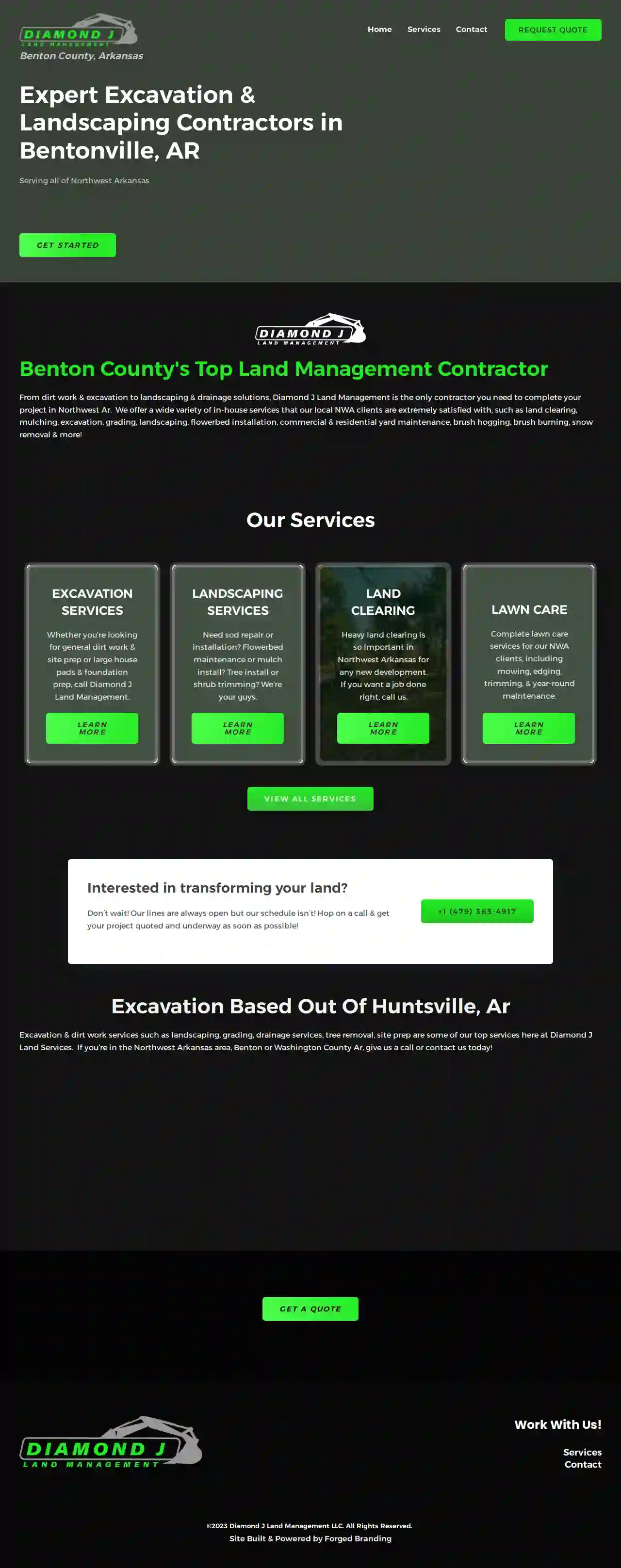Demolition Contractors Little Rock
Top 10 Demo Companies in Little Rock
Get 3 FREE Local Demolition Contractors quotes for your project today! Compare profiles, reviews, accreditations, portfolio, etc... and choose the best offer.

GNG Underground
57 reviewsRogers, USWelcome to GNG Underground Professional Excavation, Utility Trenching, and Landscaping Services for Northwest Arkansas Safety & Quality Service, Always our Priority Serving all of Northwest Arkansas Welcome to GNG Underground, providing experienced excavation and landscaping services for NWA GNG is a Veteran-Owned excavation company, based in Bella Vista and serving all of Northwest Arkansas GNG Underground is a multi-faceted excavating and landscaping company in Northwest Arkansas. From clearing land for your new project to installing storm shelters and septic tanks and propane tanks, GNG has you covered. We are your go-to outdoor utility company. We take pride in the quality of our work and the projects we complete for our clients. We offer a wide variety of outdoor excavation services in Northwest Arkansas so that when you need something done on your property, you know that you can call the trusted excavators at GNG Underground.
- Services
- Why Us?
- Gallery
Get Quote
Lukas Excavation and Demolishing
53 reviewsHot Springs, USAbout Us Licensed And Insured We are a State Licensed Excavation Contractor in Arkansas and Professionally Insured which puts us into the seat of responsibility and requires professionalism for every job we do. Prompt and Reliable We follow Arkansas State Laws and Industry Guidelines as a Licensed Excavation Contractor to complete your job promptly and reliably. We check with all Arkansas underground utility service providers before we dig to assure safety to ourselves and our customers. Satisfaction Guaranteed We strive to do every job as if we were the customer so there is complete satisfaction when the job is done. We provide excavation services in Montgomery County, Yell County, Hot Springs County, Pulaski County, Polk County, Saline County, Garland County, Pike County, Arkansas, Hot Springs, Hot Springs Village, Little Rock, North Little Rock, Malvern, Sims, Story, Mt. Ida, Mena, Russellville, Benton, Bryant, Bismarck, Maulmelle, Sherwood, Booneville, Danville, Searcy, Conway, Pine Bluff, Sheridan and many other cities within Arkansas.
- Services
- Why Us?
- Gallery
Get Quote
Les Rogers Excavating & Materials
3.834 reviews1000 Wellington Rd, Stratford, N0B 2L0, USAbout Les Rogers Inc. Les Rogers Inc. is a family-owned and operated business with over 30 years of experience in the construction industry. We are committed to providing our clients with high-quality workmanship and exceptional customer service. Our team of skilled professionals is dedicated to delivering projects on time and within budget. We specialize in a wide range of construction services, including: Residential construction Commercial construction Renovations Additions Custom homes At Les Rogers Inc., we believe in building strong relationships with our clients. We take the time to understand your needs and goals, and we work closely with you throughout the entire construction process. We are committed to providing you with a positive and stress-free experience. Contact us today to learn more about our services and to schedule a free consultation.
- Services
- Why Us?
Get Quote
Diamond J Land Management
1Rogers, US- Services
- Why Us?
Get Quote
Arrow Dirt Works
511 reviewsRogers, US- Services
- Why Us?
Get Quote
Over 3,943+ Excavation Businesses registered
Our excavation contractors operate in Little Rock and surroundings!
ExcavationHQ has curated and vetted Top Excavation Contractors in Little Rock. Find a trustworthy pro today.
Frequently Asked Questions About Demolition Contractors
- Clear the Site: Remove all furniture, appliances, personal belongings, and any valuable items from the structure.
- Secure the Perimeter: Fence off the demolition area to prevent unauthorized access and protect surrounding property.
- Disconnect Utilities: Arrange for the disconnection of electricity, gas, water, and other utilities servicing the building.
- Hazardous Material Abatement: If asbestos, lead paint, or other hazardous materials are present, have them professionally removed before demolition begins.
- Notify Neighbors: Inform your neighbors about the demolition schedule to minimize disruptions and address any concerns.
- Obtain Permits: Ensure all necessary demolition permits are in place before starting work.
- Site Security: Secure the demolition site with fencing and warning signs to prevent unauthorized access.
- Personal Protective Equipment (PPE): Workers should wear appropriate PPE, including hard hats, safety glasses, gloves, and steel-toe boots.
- Hazardous Material Removal: Properly identify and remove asbestos, lead paint, or other hazardous materials before demolition begins.
- Utility Disconnections: Disconnect all utilities, such as electricity, gas, and water, before demolition.
- Controlled Demolition Techniques: Employ controlled demolition methods to minimize risks and ensure the structure comes down safely.
- Dust Control: Implement dust suppression measures, such as water spraying or misting, to reduce airborne particles and protect air quality.
- Emergency Planning: Have an emergency plan in place, including communication protocols and evacuation procedures, in case of unforeseen events.
- Dust Suppression: Use water spraying, misting systems, or other dust suppression techniques to control airborne particles.
- Noise Barriers: Erect temporary noise barriers around the demolition site to reduce noise transmission to nearby properties.
- Work Schedule: Schedule noisy demolition activities during permitted hours to minimize disturbance to neighbors.
- Communication: Keep neighbors informed about the demolition schedule and any potential disruptions.
How do I prepare my property for demolition?
What are the safety precautions for demolition?
What is asbestos abatement?
How can I minimize the dust and noise from demolition?
How do I prepare my property for demolition?
- Clear the Site: Remove all furniture, appliances, personal belongings, and any valuable items from the structure.
- Secure the Perimeter: Fence off the demolition area to prevent unauthorized access and protect surrounding property.
- Disconnect Utilities: Arrange for the disconnection of electricity, gas, water, and other utilities servicing the building.
- Hazardous Material Abatement: If asbestos, lead paint, or other hazardous materials are present, have them professionally removed before demolition begins.
- Notify Neighbors: Inform your neighbors about the demolition schedule to minimize disruptions and address any concerns.
- Obtain Permits: Ensure all necessary demolition permits are in place before starting work.
What are the safety precautions for demolition?
- Site Security: Secure the demolition site with fencing and warning signs to prevent unauthorized access.
- Personal Protective Equipment (PPE): Workers should wear appropriate PPE, including hard hats, safety glasses, gloves, and steel-toe boots.
- Hazardous Material Removal: Properly identify and remove asbestos, lead paint, or other hazardous materials before demolition begins.
- Utility Disconnections: Disconnect all utilities, such as electricity, gas, and water, before demolition.
- Controlled Demolition Techniques: Employ controlled demolition methods to minimize risks and ensure the structure comes down safely.
- Dust Control: Implement dust suppression measures, such as water spraying or misting, to reduce airborne particles and protect air quality.
- Emergency Planning: Have an emergency plan in place, including communication protocols and evacuation procedures, in case of unforeseen events.
What is asbestos abatement?
How can I minimize the dust and noise from demolition?
- Dust Suppression: Use water spraying, misting systems, or other dust suppression techniques to control airborne particles.
- Noise Barriers: Erect temporary noise barriers around the demolition site to reduce noise transmission to nearby properties.
- Work Schedule: Schedule noisy demolition activities during permitted hours to minimize disturbance to neighbors.
- Communication: Keep neighbors informed about the demolition schedule and any potential disruptions.